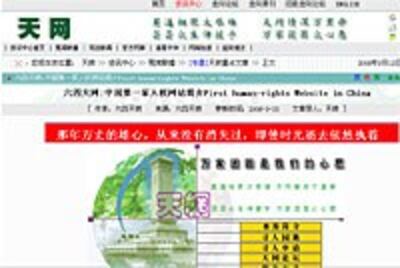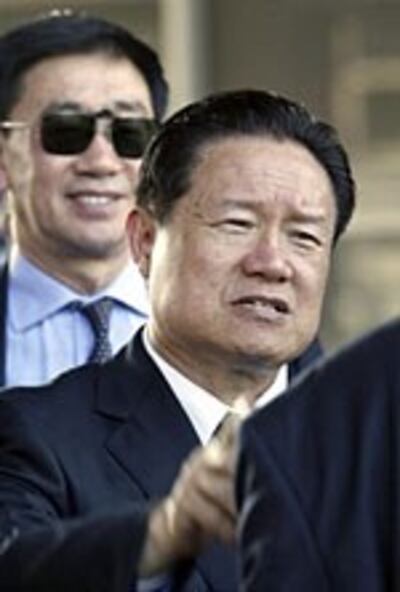
Sichuan-based rights activist Huang Qi was one of the first in China to use the Internet to carry out human rights work. His site helps people to track friends and loved ones kidnapped by human traffickers or otherwise unaccounted for. Jailed for five years for “incitement to subversion,” Huang was awarded the 2004 Internet Freedom Prize by Paris-based Reporters Sans Frontieres. He spoke to Jill Ku’s “Different Voices” in an in-depth interview for RFA’s Mandarin service.
Huang Qi: In 1998, a lot of women and children were getting kidnapped [for trafficking] and the government wasn't really doing anything effective to prevent it. They had just about managed to set up a kidnapping office to deal with the trafficking in women and girls but it wasn't really much use. So we set up the Tianwang Missing Persons Bureau to help tackle this problem. It was in operation from 1998-2002.
On Dec. 1 1998, the kidnapping office of the Chengdu municipal police department invited our group to take part in a meeting to tackle kidnapping. After the meeting the police told us that seven young women had been kidnapped and sold to Renshou county, but because of systemic problems the Chengdu police were only able to take on cases that originated in Chengdu city. We immediately agreed to help.

When we got to Renshou county things went fairly smoothly. We managed to rescue all seven women within about 10 hours of our arrival, and we hurried back to Chengdu. After we got back to Chengdu there was a lot of interest from both the local media and some national media because a private organization had become involved in such a major case, and in fact its success was entirely managed by Tianwang, with the help of the police.
Jill Ku: But then there was a dramatic turnaround in the attitude of the authorities. Huang's work had evidently touched on some sensitive nerves.
I believe that in a future China things won’t be this way. I think that those of us who blaze a trail have to pay this sort of price.
Huang Qi: Then, after three days of news reports on the case, something happened. The media got a directive from the Sichuan provincial propaganda department clearly ordering them to stop all reports on this story. At that time in China, everybody knew that no sex industry operation could possibly hope to exist without the involvement of the local police force. Therefore the local police departments and the provincial police department were opposed to our making this matter public. This even included some of my friends in the Sichuan provincial police department who told me very clearly not to get involved in this sort of thing.
Jill Ku: The attitude of the police and the officially controlled media toward the missing persons bureau held back its development and forced Huang to set up the June 4 Tianwang Web site. Huang was also increasingly working with people who had grievances against the government.
Huang Qi For a number of reasons, we set up the Tianwang June 4 Web site on June 4, 1999. What's more, following the refusal of the authorities to do anything to help in the case of the seven abducted women, we began to take an interest in the number of complaints and grievances against the government, miscarriages of justice, and so on. We also received a lot of support from the Chinese media in this work.
We have been the target of every kind of official obstruction. But we are not going to give up. We have never been involved in politics in our seven years of human rights work. We approach things entirely from the point of view of human rights, and our work has also included protecting the rights of members of the Chinese Communist Party.
In October 1999, the People's Daily wrote an official report about us, titled 'The Tianwang Missing Persons Bureau.' By the end of the year, we were listed as the second biggest event on the Web after the government's online operations.
Jill Ku: The June 4 Tianwang Web site won broad support and participation among ordinary Chinese people.
Huang Qi We had more than 800 people working for us across China and contacts with more than 1,000 reporters, who supplied us with a great deal of information, focusing in particular on the countryside and injustices suffered by farming communities. At the same time, we were liaising on behalf of Tiananmen Square massacre victims and Falun Gong practitioners.
Most of the articles I wrote were commentaries, from the point of view of social trends. Most of the detailed reports about individual cases were written by volunteers, who were often themselves the victims of injustice and wrongdoing, who had become involved with Tianwang through their own petitioning activities, and then volunteered to work for us.
Jill Ku: So it was that the Tianwang Web site became one of the biggest missing persons Web sites, and could also be called the first human rights Web site inside China.
Huang Qi Among the reports published by the Tianwang Missing Persons Bureau and the Nahan Web site, we later found that around 95 percent of them were in the countryside. We had always aimed to focus on the least fortunate in Chinese society, and it was clear that farming communities were a big hot spot, and they were the issue that most concerned us, and we will never forget that.

All the Chinese media, including the Fuzhou Evening News run by Mr. Li Changqing, the Sichuan News, and the People's Daily, recognized that we were the first human rights Web site and the first Web site to concern itself with the plight of ordinary people seeking redress for injustice.
Jill Ku: But the Tianwang Web site had exposed some major cases, and it was soon to be closed.
Huang Qi: [But] on March 22, 2000, we reported the death in custody of Falun Gong practitioner Chen Zixiu. About eight days after that report, the government closed down the Tianwang Missing Persons Web site.
Jill Ku: Huang was detained on June 4 and released on June 4. The Tianwang Web site was set up on June 4, on the 10th anniversary of the pro-democracy movement in Tiananmen Square.
Huang Qi: Of course I had reckoned on getting into this sort of trouble. After all, we set up the Tianwang Web site on June 4, 1999, and June 4 is a milestone in Chinese history, commemorating a day when the Chinese people stood up against authoritarianism and corruption. That's why we called it the June 4 Tianwang Web site.
At that time there wasn’t much official control of the Internet in China. But then the new policies came in, and the big portals like Xinlang, Sohu, and Yahoo didn’t want to include us in their search engines. When I was in touch with the people from Xinlang I asked them why the Tianwang Missing Persons Bureau couldn’t be included and they told me it was on a word from higher up. I asked them who they meant by “higher up,” and they said it was the police. They are very sensitive to the word June 4 because they feel it is rubbing salt into their wounds.
It was ridiculous [from a legal point of view] for them to close down the Web site at that time because there were no regulations in place regarding the control of the Internet. So they had to give the explanation that our hardware contained some illegal components. I asked them what components and for proof of these components, but they couldn’t give me any proof.
Jill Ku: According to Huang, the Tianwang Web site was closed after it reported the death in custody of a Falun Gong practitioner.
Huang Qi: When the Web site had been closed for 15 days, we began to get support from some patriotic Chinese in the United States. They opened a new server for us on April 15, 2000.
On June 4, 2000, we reported the beating to death of June 4 activist Zhou Guocong in jail. Sixty hours later the authorities had arrested me and put me in jail. They took three years to get around to handing me a five-year sentence. I was released on June 4, 2005.
Jill Ku: Huang was held without charge for three years before finally being sentenced to five years. He was released after five years behind bars.
Huang Qi: There are two reasons for this. One is that I refused to cooperate with their every attempt to get a confession out of me. I refused to sign any of their investigative statements. Another reason is that there was a lot of conflict within the system itself about whether my case should come to trial at all. A lot of people, including the domestic media, were speaking up on my behalf.
For example, on June 5, 2000, after my arrest, China Central Television immediately got together a TV crew to come and interview the acting head of the Tianwang Web site, who happened to be my wife. On Dec. 23, 2000, after a lot of pressure from people high up in government and a lot of friends, my wife Zeng Li was invited to the Great Hall of the People in Beijing to receive an award called the China Patriotic Star, the highest honor in the country.
Human rights work goes on
So you can see the authorities were very much divided about what to do with Huang Qi. What's more, I'm not someone who is against the system. Since my arrest, we have collected around 2,400 news reports of a positive nature from the domestic Chinese media, including the People's Daily, Xinhua news agency, and several major city newspapers. So it wasn't that easy to turn Huang Qi's reputation around overnight.
During this time, [then provincial Party secretary] Zhou Yongkang was playing a very negative role in the affair, calling on the Sichuan provincial national security police and the provincial police department to collect so-called evidence against me, to win prestige for himself. Finally they managed to turn Huang Qi into a subversive political criminal. Of course he won great praise for this mission and eventually entered the heights of Zhongnanhai as the national chief of the public security bureau, the political secretary of the People’s Armed Police, and the first deputy secretary of the Crime and Law Committee.
And that’s not just my view of the matter. That is also the view of overseas commentator Lin Baohua, who wrote an article in December 2002 ... which talked about Zhou’s promotion to Beijing and his greatest success in Sichuan, which was to succeed in closing down the June 4 Tianwang Web site and jailing Huang Qi.
Jill Ku: Eventually, the authorities got around to charging Huang with "incitement to subversion of state power". The appeal judgement described the charges against him the following way.
Courtroom drama
Huang Qi: The appeal judgment read thus: 'It doesn't matter whether you say he was speaking up for June 4, or for the pro-democracy movement, or for the Falun Gong. The key point is that Huang Qi's aim was to set up the first human rights Web site in China.' This judgment was all the more ironic coming at a time when central government had just enshrined the protection of human rights into the Chinese Constitution.
In September 2000, three police officers came and put manacles on me because I had written something about the illegal acts of Zhou Yongkang and the Sichuan authorities. They grabbed hold of my genitals, and I fainted immediately. When I came round I was covered in blood. That picture of me with head injuries that circulated on the Internet—that was from that time.
Another event that sticks in my memory took place in 2003, after the second appeal hearing. After we got to the court, the judge read out the bit about the verification of evidence and due process, and I asked her when they had carried out that verification. She didn’t answer, so I asked her again. She said if there were any problems we could discuss them after the hearing. I said, “You have locked me up for three years. What chance have I had to discuss anything with anyone? All that talk of verification of evidence is just to fake it for the media and cover up your fascist methods.”
At that point she got really angry and said to the court police: “Preserve discipline in the court.” At which point they gagged me and a bunch of them came over to beat me. I shouted at the top of my voice: “Fascist bandits, Ceausescu is waiting for you in hell! Saddam Hussein is your role model!”
Inhuman conditions
After that they dragged me down into the basement of the of Sichuan Intermediate People’s Court. The heroic activities of these court police are not normally visible to the naked eye. There were dozens of them, men and women. As soon as they saw a so-called criminal in manacles, a crowd of them came over to have a go at me. You won’t see this sort of courage on your television screens, I’ll tell you. They were pushing each other away to be the first to get the boot in. I told the judge I had just been beaten up. She said that’s normal here, Huang Qi, and I can’t record that. If I did I would lose my job. I said I understood perfectly, laughing as I said it.
I believe that in a future China things won’t be this way. I think that those of us who blaze a trail have to pay this sort of price.
Jill Ku: Huang couldn't bear the inhuman treatment he received in jail and wanted to end his own life.
Huang Qi: After I went in to jail they put me in a holding cell next to the toilets where everyone went for a piss. I slept on the floor. Whenever anyone took a piss the urine would splash onto my face. I also had to endure interrogations aimed at extracting a confession. There are limits to what any human can endure. When I reached those limits I would surrender to the authorities' will. I had also realised it wouldn't be possible to escape, and was considering suicide. But eventually I went free, after five years inside.
Jill Ku: On his release, Huang started up the June 4 Tianwang Web site once more.
Huang Qi: Since the closure of the Tianwang Missing Persons' Web site I had been getting funding together to run the Web site again. In April this year we re-opened the June 4 Tianwang Web site. Since then we have worked on a few cases including the successful campaign for compensation for Tiananmen victim Zhou Guocong. Another was on behalf of a Web site called State of the Chinese Nation, and the third was working for the release of China Pan-Blue Alliance member Zhang Qi.
[During our continued human rights campaigning] we have been the target of every kind of official obstruction. But we are not going to give up. We have never been involved in politics in our seven years of human rights work. We approach things entirely from the point of view of human rights, and our work has also included protecting the rights of members of the Chinese Communist Party.
Since the compensation award for Zhou Guocong—whose case had a direct bearing on my own arrest and sentencing—there has been a renewal of interest, with a request for a meeting from the U.S. Ambasador himself. I have also been the target of harassment from the police.
Original reporting in Mandarin by Jill Ku and Hong Wei. RFA Mandarin service director: Jennifer Chou. Translated and produced for the Web by Luisetta Mudie. Edited by Sarah Jackson-Han.
